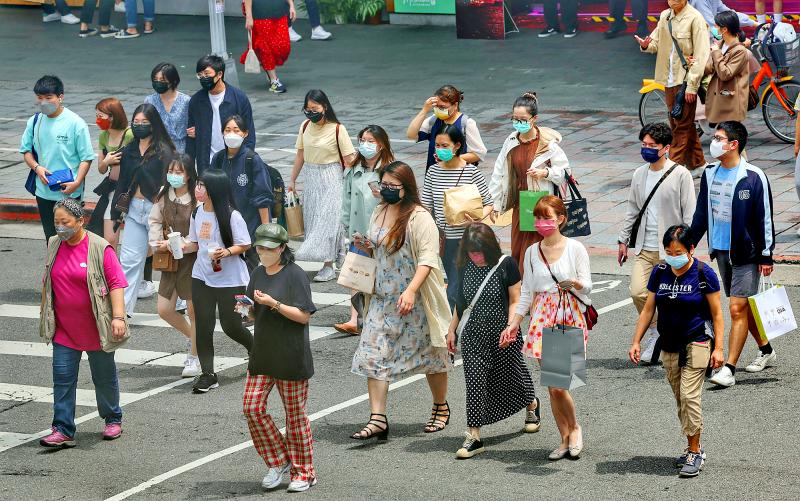About 32 percent of companies in the industrial and service sectors raised wages last year thanks to growing revenue amid a stable global economy, the Directorate-General of Budget, Accounting and Statistics (DGBAS) said on Thursday.
Citing a survey, the agency said that 34.7 percent of employers in the industrial sector and 28.7 percent in the service sector raised wages last year.
The survey showed that 76.9 percent of financial and insurance companies last year raised regular wages of employees, followed by 41.7 percent in the manufacturing industry, it said.

Photo: CNA
The pay hikes in the financial sector reflected a booming equity market last year, which boosted the profitability of many financial firms, while export-oriented tech companies raised pay as they benefited from robust global demand for emerging technologies, said Chen Hui-hsin (陳惠欣), deputy director of the agency’s Census Department.
Among the employers that raised wages, 50.2 percent based salary increases on employee performance, while 36.0 percent considered higher profits and 34.5 followed the government’s minimum wage increase, the agency said, adding that 16.8 percent considered the effects of inflation on their workers.
In the first quarter of the year, 33.6 percent of employers in the industrial and service sectors said they planned to raise wages, while 67 percent of companies with a workforce of more than 100 employees had either given pay increases or were planning to do so.
However, there is growing uncertainty about the domestic economy due to high inflation caused by a spike in commodity prices amid the Ukraine invasion and the surge of local COVID-19 cases, Chen said.
Whether wages would remain at their new levels and for how long is uncertain, she said.

South Korea’s equity benchmark yesterday crossed a new milestone just a month after surpassing the once-unthinkable 5,000 mark as surging global memory demand powers the country’s biggest chipmakers. The KOSPI advanced as much as 2.6 percent to a record 6,123, with Samsung Electronics Co and SK Hynix Inc each gaining more than 2 percent. With the benchmark now up 45 percent this year, South Korea’s stock market capitalization has also moved past France’s, following last month’s overtaking of Germany’s. Long overlooked by foreign funds, despite being undervalued, South Korean stocks have now emerged as clear winners in the global market. The so-called “artificial intelligence

NEW IDENTITY: Known for its software, India has expanded into hardware, with its semiconductor industry growing from US$38bn in 2023 to US$45bn to US$50bn India on Saturday inaugurated its first semiconductor assembly and test facility, a milestone in the government’s push to reduce dependence on foreign chipmakers and stake a claim in a sector dominated by China. Indian Prime Minister Narendra Modi opened US firm Micron Technology Inc’s semiconductor assembly, test and packaging unit in his home state of Gujarat, hailing the “dawn of a new era” for India’s technology ambitions. “When young Indians look back in the future, they will see this decade as the turning point in our tech future,” Modi told the event, which was broadcast on his YouTube channel. The plant would convert

‘SEISMIC SHIFT’: The researcher forecast there would be about 1.1 billion mobile shipments this year, down from 1.26 billion the prior year and erasing years of gains The global smartphone market is expected to contract 12.9 percent this year due to the unprecedented memorychip shortage, marking “a crisis like no other,” researcher International Data Corp (IDC) said. The new forecast, a dramatic revision down from earlier estimates, gives the latest accounting of the ongoing memory crunch that is affecting every corner of the electronics industry. The demand for advanced memory to power artificial intelligence (AI) tasks has drained global supply until well into next year and jeopardizes the business model of many smartphone makers. IDC forecast about 1.1 billion mobile shipments this year, down from 1.26 billion the prior

People stand in a Pokemon store in Tokyo on Thursday. One of the world highest-grossing franchises is celebrated its 30th anniversary yesterday.